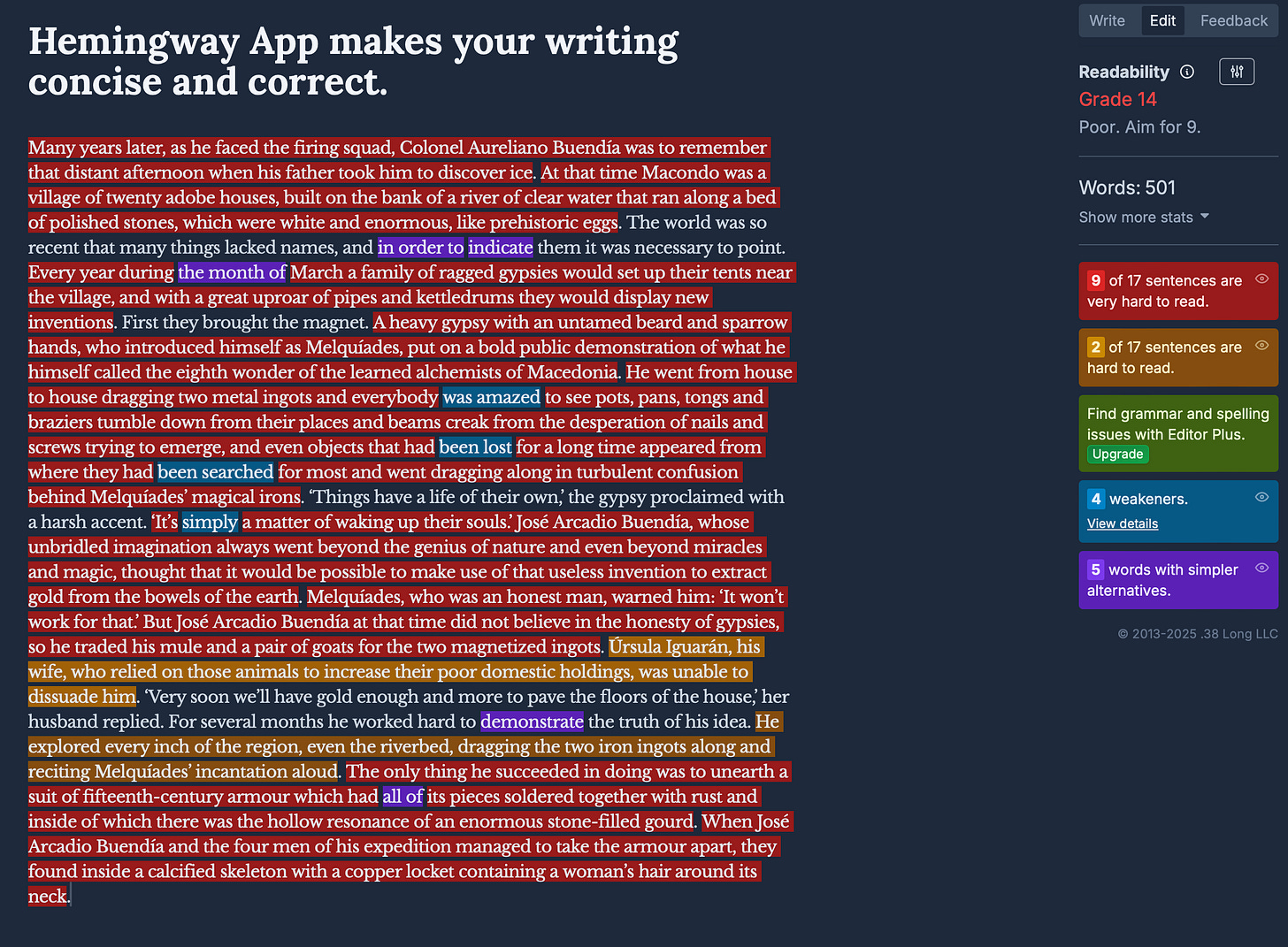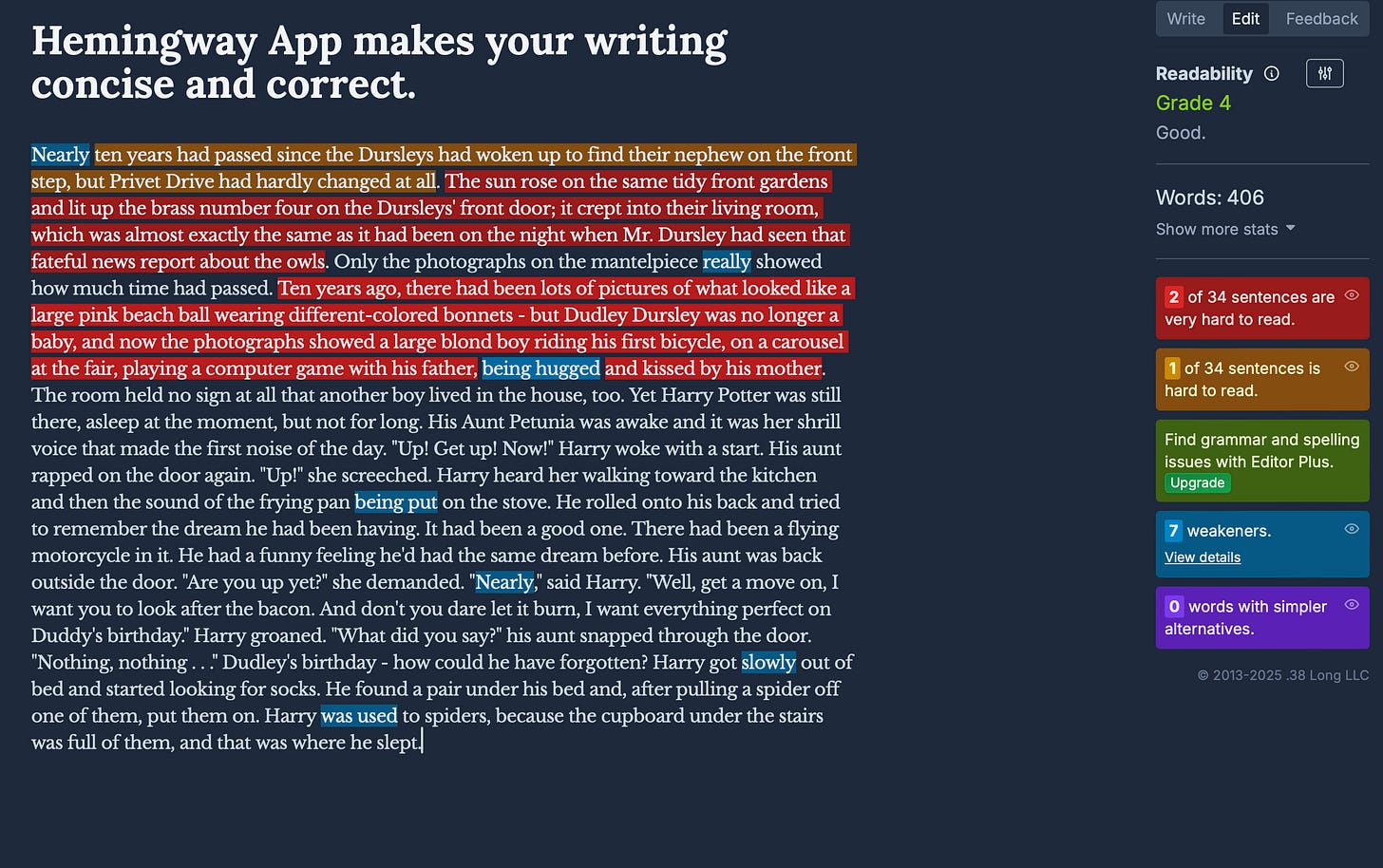Hemingway App is a new AI editor designed to help you improve your writing. It claims that it “makes your writing concise and correct,” and gives a rating for readability. Lower scores are better. 9 is the cutoff for “good” writing.
Naturally, I was curious — how would Hemingway rate some of the greatest writers of all time? So I ran excerpts from a few of my favorites through the app to see what it had to say.
Here’s who was put to the test:
David Foster Wallace: Pulitzer Prize nominee, Whiting Award winner, perennial Best Books of the Year listee.
James Baldwin: A literary titan whose legacy defies a single sentence.
Colson Whitehead: Author of The Underground Railroad, two-time Pulitzer Prize winner.
J.K. Rowling: Creator of Harry Potter series, whose characters are beloved (even if she sparks controversy).
George Saunders: PEN Award winner, National Book Award recipient, all-around literary gem.
Gabriel García Márquez: One Hundred Years of Solitude is a load-bearing wall of fiction.
Sylvia Plath: Posthumous Pulitzer Prize winner, poet of haunting brilliance.
Margaret Atwood: Author of The Handmaid’s Tale, a masterclass unto herself.
Audre Lorde: Professor, philosopher, civil rights activist, poet, lesbian, and the person living or dead I would most like to have a beer with.
Here are the results:
David Foster Wallace — Excerpt from A Supposedly Fun Thing I’ll Never Do Again. Score: 13. Just OK. Too hard to read.
James Baldwin: Excerpt from Part 1 of Notes of a Native Son. Score: 15. Poor. Hemingway flagged “weakeners” and complex sentences.
Gabriel García Márquez: The iconic opening of one of the greatest masterpieces of all time. Score: 14. POOR.
JK Rowling: Score: 4. Nice job!
Colson Whitehead: Chapter 1 of The Underground Railroad. Score: 11. Close, but keep trying!
Sylvia Plath: One of the most haunting excerpts from The Bell Jar. Tied with Baldwin for worst score: 15. Better luck next time, Sylvia!
Margaret Atwood scored a 9 and Audre Lorde scored a 13.
The beginning of George Saunders’ “Escape from Spiderhead” scored a 7 (Good!) and the end scored an 11 (Just OK).
Now, let’s get to the point:
An AI tool can’t tell you how to write. It can follow grammar rules (which are constantly evolving) and suggest ways to improve clarity. But this isn’t “correct” writing.
Your unique voice is correct.
Let me say this as clearly as possible:
You don’t follow rules to write well.
Your voice isn’t a set of grammar guidelines—it’s already inside you. The real work is finding it and bringing it forward. That takes practice and courage.
I’m not saying writing techniques and craft aren’t valuable — they are. I’m not even saying tools like Hemingway can’t be useful for cleaning up drafts (I use ChatGPT for grammar checks!). But they’re not enough.
If your goal is to write like a robot, then by all means, use a robot. But if your goal is to express a new thought, capture an authentic experience, or uncover something true—something that could change you, and in turn, someone who reads your words— there is no shortcut. You have to do the work yourself. That means going into your own heart, writing, rewriting, and listening until you hear your own voice. Then you have to have the courage to share it.
Here’s the thing — it will sound different for every person. What makes writing powerful is not grammatical precision, it’s resonance. Resonance comes from humans recognizing themselves in other humans.
AI, for all its computational power, doesn’t feel. It doesn’t understand things like rhythm, subtext, or unexpected connections that speak to the human experience. It doesn’t understand the human experience because it is not human. You are, so who better to write about your experiences than you?
What I’m encouraging you to do is let go of the rating systems we have attached to writing, which label it as good, okay, or poor. Focus instead on telling the truth. The truth of your experience—however weird, terrible, beautiful and complex it may be. It is very simple, and much harder than it sounds.






